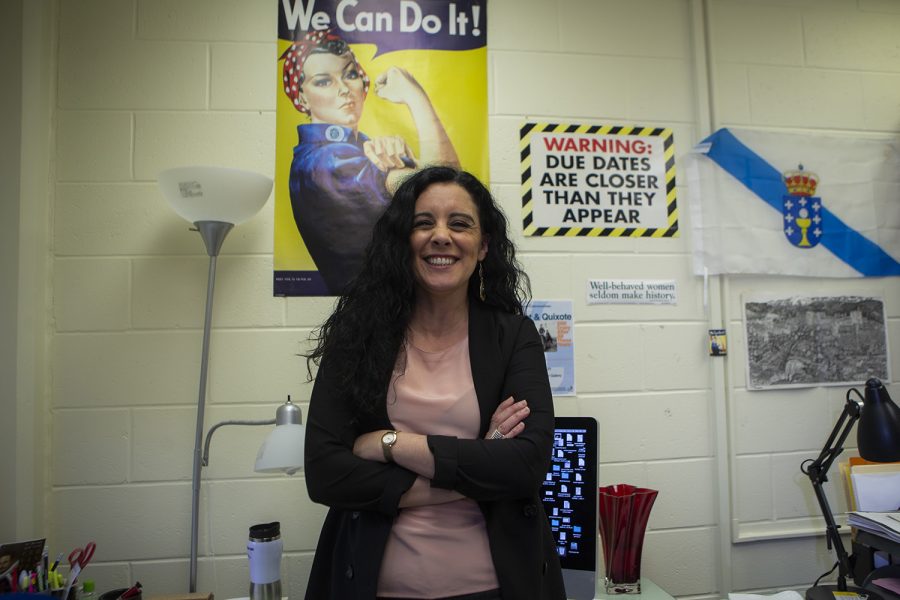Passion for teaching Spanish lit brought UI professor Ana Rodríguez-Rodríguez from Spain to the U.S.
A University of Iowa professor’s love for teaching brought her from Spain to the Midwest to educate students on early 16th and 17th century Spanish literature.
Ana Rodriguez Rodriguez poses for a portrait in her office in Phillips Hall on Monday, March 9, 2020. Rodriguez holds a PhD in Spanish Literature from the University of Wisconsin and is working on her second from Universidad Complutense de Madrid in Critical Edition.
March 24, 2020
As a first-generation student, Ana Rodríguez-Rodríguez, Spanish and Portuguese associate professor and director of graduate studies, found it hard to talk about her difficulties and challenges she experienced as a student with her parents, but felt it made her more of a fighter when she left Spain to come to the U.S. and pursue her master’s degree in Spanish literature.
Rodríguez-Rodríguez chose eventually to stay in the U.S. and earn her Ph.D., and all was made possible by a scholarship she received that covered her tuition.
“I didn’t have so many opportunities [to make mistakes], which I think was positive because it made me take care of every single thing very, very carefully,” she said.
A master’s degree and two doctorates later, Rodríguez-Rodríguez holds a tenured position at the University of Iowa as the director of graduate studies for Spanish and Portuguese and the interim director executive officer of the department of French and Italian.
Rodríguez-Rodríguez said she is passionate about literature, history, and teaching. She fell in love with teaching Spanish literature early in her life, Rodríguez-Rodríguez said, and is grateful to have found her job at the UI, which was her first teaching job.
Rodríguez-Rodríguez said she loves communicating her thoughts and ideas to others and helping younger people learn about literature and history.
Her identity as a first-generation student helps her understand some of the struggles her students face and allows her to relate to those with the same identity as her, she added.
“I think that gives me empathy, and to be more empathetic with people, which I think is also another thing teachers and professors should have … so I think that really helped me,” she said.
Rodríguez-Rodríguez specializes in early modern Spanish literature in the 16th and 17th centuries. She has written one book and is currently working on her second.
RELATED: From high school dropout to UI administrator, Maria Bruno is an ‘inspiration’ to Hawkeyes
Her first book was published in 2013 and is about Spanish captives in North Africa and how their writing helped the Spaniards understand their experiences. One of the authors she focused on was Miguel de Cervantes, author of Don Quixote, Rodríguez-Rodríguez said.
Her research focuses on the history of Spanish literature, and the experiences Spanish authors wrote about while they were away from their homeland, Rodríguez-Rodríguez said. The book she is currently working on studies the writing of Spanish authors while they navigated living in the Philippines.
Rodríguez-Rodríguez had an exhibit at the Instituto Cervantes in Madrid, Spain titled “Tan an sabia como valerosa. Mujeres y escritura en los Siglos de Oro” which translates to: “As wise as courageous. Women and writing in the Golden Age.” The exhibit opened March 5 and concerns women in early Spanish literature.
During this time period, women were not supposed to be educated and their primary role was to be a mother, Rodríguez-Rodríguez said. The women discussed in the exhibit wrote about violence against women, how women should be educated, and their writing ability.
“These are fascinating figures, women who had these — I would say feminist ideas — and ideas where they defended women’s situation in the world, as people and as writers,” Rodríguez-Rodríguez said.
Luis Muñoz, a colleague of Rodríguez-Rodríguez a in the Spanish and Portuguese department and UI Associate Professor, said in an email to The Daily Iowan that Rodríguez-Rodríguez is responsible and well liked by her students and colleagues. She has a good sense of the “big picture” for the department when it comes to policies and changes that are beneficial to students, he said.
“I think her research on women of the Spanish Golden Age is a great contribution to our understanding of the literary production and daily lives of women in this period,” Muñoz said.
Spanish and Portuguese Department Executive Chair Denise Filios said Rodríguez-Rodríguez was the Faculty Assembly President in the College of Liberal Arts, which gave Rodríguez-Rodríguez the opportunity to develop and grow her leadership skills.
Rodríguez-Rodríguez has also helped to grow both the undergraduate and graduate Spanish programs, Filios said.
“Not all literature faculty teach the languages classes and so I think it just shows how interested she is in really helping students develop and grow and master Spanish,” Filios said, “ … improve their speaking, and improve their writing but also learn the material’s literature and culture.”



